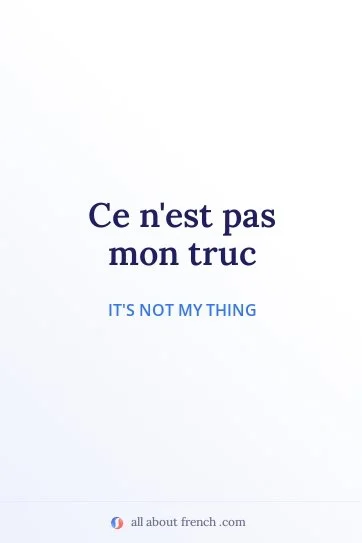
We are going to show you everything you ever wanted to know about the basic French sentence "Ce n'est pas mon truc". It includes a complete definition of what it is and how to use it in a dialogue with an audio example.Additionally, we also added some useful things like dialogue example, slow pronunciation audio, synonym and more!
Translation : It's not my thing
Register : Informal - Basic
Slow
Normal
IPA : / sə nɛ pa mɔ̃ tʁyk /

It literally means:
Depending on context, this French sentence can have two meanings: that you are not very good at something or that you don't enjoy doing something.
First scenario: someone asks you if you are a talented singer, but you're really not... so you can say: "Non, ce n'est pas mon truc". It doesn't mean that you don't like to sing, just that you are not talented.
Second scenario: someone asks you if you enjoy doing hiking and you hate it, you can also say: "Non, ce n'est pas mon truc". Here, it's clear that you just don't like it, even if you might be good at it.
Disclaimer: both scenarios aren't 100% independent because we tend to be good at what we enjoy doing and vice versa...
You can also use "C'est pas mon truc" which is exactly the same thing, but a bit shorter. Indeed many French people skip the " n' " part, which represents the negation, because the word "pas" is clear enough to make the sentence negative.
A very-similar-but-yet-different sentence that you can use is "Ce n'est pas mon problème" which is a very very polite way to say "I don't care" (literally: "It's not my problem").
↓ Example in a story with slow audio ↓
Finally, let's see an example in a parallel story with slow audio.
Un film triste
A sad movie
10%
The story just started!
Get full access to 365 texts and quizzes, including this one.
 Discover more
Discover more Already a member? Full story and quiz here.
